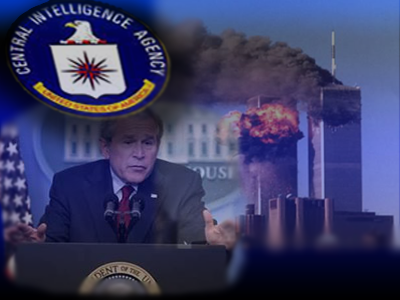9/11 Unmasked
by David Ray Griffin and Elizabeth Woodworth: A Review

Note to readers: please click the share buttons above. Forward this article to your email lists. Crosspost on your blog site, internet forums. etc.
Although not a topic for polite conversation, nor a widely recognized ‘acceptable’ issue for mainstream academics and journalists, the issue of 9/11 and the multiple questions that persist with respect to this transformative event continue to bubble under the surface. 9/11 ushered in the global ‘war on terror’, shaping the geo-political agenda of Western governments for almost two decades now and having a deleterious impact on civil liberties across Western liberal democratic states. Torture has been used as part of official policy and there is bulk data collection and surveillance of entire populations.
In recent years, further information has come into the public domain, via the UK Chilcot report regarding the formative stages of the post 9/11 ‘war on terror’: Within days of 9/11 having occurred a British embassy cable reported that ‘the “regime-change hawks” in Washington are arguing that a coalition put together for one purpose (against international terrorism) could be used to clear up other problems in the region’; Chilcot also published a Bush-Blair communication from the aftermath of 9/11 which discussed phase two of the ‘war on terror’ and indicated debate over when to ‘hit’ countries unconnected with Al Qaeda, such as Iraq, Syria and Iran.
Broadly speaking, Chilcot corroborated former Supreme Allied Commander Wesley Clark’s claim that he was informed, immediately after 9/11, that seven countries, including Syria, were to be ‘taken out’ in five years.
It is against this backdrop that 9/11 Unmasked by David Ray Griffin and Elizabeth Woodworth now emerges. The book is the culmination of seven years work by the 9/11 Consensus Panel which includes 23 experts from fields including physics, chemistry, structural engineering, aeronautical engineering, piloting, airplane crash investigation, medicine, journalism, psychology, and religion. It’s honorary members include the late Ferdinando Imposimato, Honorary Pres. of the Italian Supreme Court, and others listed here, including Lynn Margulis (also late). The panel has examined and reviewed a wide variety of evidence which brings into question the official narrative regarding 9/11 and employed a standard ‘best-evidence consensus model’ commonly used in science and medicine in which each ‘consensus point’ was only accepted after three rounds of review and a vote of at least 85 percent.
The results, detailed and fully referenced, are presented in this book and cover remarkably wide and disparate areas in which the official narrative, as sanctioned by the official 9/11 Commission Report, are questioned. These areas include questions regarding the collapse of the Twin Towers and the third building, WTC7, which collapsed much later in the day, the attack on the Pentagon, the hijacked flights, US military exercises on and before 9/11, the activities of key military and political leaders, the relationship between the alleged hijackers and Osama bin Laden and evidence concerning insider trading.
The question now, both for the academy and for journalists, is whether this accumulation of substantial questions can be ignored any longer, especially given the evidence we now have that the so-called ‘war on terror’ was exploited, right from the start, in order to engage in a series of regime-change wars. We already have had the notable establishment figures Senator Bob Graham and CIA’s Bob Baer publicly raising questions regarding, for example, alleged Saudi involvement in 9/11 whilst a very recent book by Duffy and Nowosielski also raises questions with regard to the actions of the CIA in relation to 9/11.
In addition, there is currently an abundance of activity that has emerged from professional-based organisations: the Lawyers’ Committee for 9/11 Inquiry has recently filed a Grand Jury petition with the U.S Attorney in Manhatten, the Bobby Mcilvaine Act is being promoted to congress persons by Architects and Engineers for 9/11 Truth, and the University of Alaska Fairbanks study on the WTC7 collapse is due to report shortly.
The diligent and painstaking work by Griffin and Woodworth and the 9/11 Consensus Panel lays down a serious challenge for mainstream academics and journalists to start to ask substantial questions about 9/11 and to examine the event in a way that enables there to be a full, accurate and truthful rendering of the events in question. If they are true to the ideals of their respective professions, journalists and academics will address these difficult questions, search for the facts, and speak truth to power. Failure to do so will, in the final analysis, render much of these professions defunct and irrelevant.
*
This article was first published on OffGuardian.


